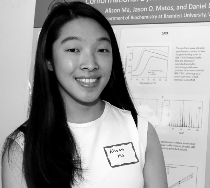Alison Ma
 Oprian Laboratory
Oprian Laboratory
Department of Biochemistry
Brandeis University
Conformational Dynamics in Terpene Synthases Poster Abstract
Poster Abstract
Terpenes form the largest class of natural products. They provide a wide variety of uses with applications ranging from fragrances to therapeutics, to even serving as potential biofuels. Although thousands of different terpenes exist, all are derived from two 5-carbon universal precursors, dimethylallyl pyrophosphate (DMAPP) and isopentenyl pyrophosphate (IPP), linked head to tail to form C10 monoterpenes, C15 sesquiterpenes, and C20 diterpenes.
The committed step in all terpene biosynthetic pathways is catalyzed by a terpene synthase responsible for cyclization of the hydrocarbon product through intermediary generation and control of high energy carbenium intermediates. A firm mechanistic understanding of terpene synthase reactions is a prerequisite to exploitation of this remarkable class of proteins. Much is known about the carbocation cascade facilitated by terpene synthases, but insight into structural protein dynamics is lacking.
The focus of this project is on pentalenene synthase, the enzyme responsible for cyclization of farnesyl diphosphate to the sesquiterpene antibiotic precursor pentalenene. Solution NMR can be used to monitor conformational changes during the reaction and to follow dynamics of the enzyme during initial interaction with the farnesyl diphosphate substrate. Many terpene cyclases are too large for NMR spectroscopy or are dimers in solution, but pentalenene synthase is a 38kDa monomer, making it the perfect candidate for NMR studies (Cane, 1990; Christianson, 2017). In addition, the enzyme structure has been solved by X-ray crystallography. These studies will elucidate the conformational landscape that pentalenene synthase navigates during catalysis and thus form the foundation for a mechanistic understanding of this important class of enzymes.
Personal Statement
Thanks to the M.R. Bauer Foundation I was able to work full-time in the Oprian Lab on terpene synthases this summer. Although I had joined the lab the previous year, juggling academic coursework along with extracurricular activities and research made it difficult to really dive in to the experiments necessary for my projects. With the guidance of my mentor, I have been able to learn new skills and techniques while making significant strides in my project. Working in the lab this summer has made me more confident in troubleshooting problems and finding ways to overcome them when they inevitably arise. Furthermore, doing full-time research has given me an opportunity to understand what pursuing further education in the life sciences may be like after Brandeis. I am very thankful for this summer of research in which I not only got to work on my own project but also had the opportunity to develop critical thinking skills that I will be able to use both in and out of research.